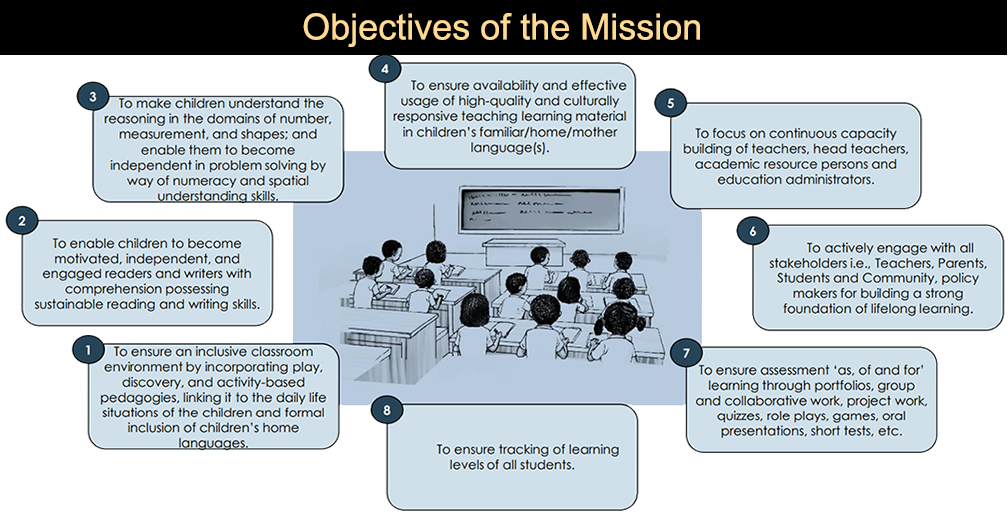Governance
NIPUN Bharat Mission
- 06 Jul 2021
- 6 min read
Why in News
The Ministry of Education has launched NIPUN (National Initiative for Proficiency in Reading with Understanding and Numeracy) Bharat Scheme.
- It aims to cover the learning needs of children in the age group of 3 to 9 years.
Key Points
- Part of NEP 2020:
- This initiative is being launched as a part of NEP (National Education Policy) 2020.
- This policy aims to pave the way for transformational reforms in school and higher education systems in the country. This policy replaced the 34 year old National Policy on Education (NPE), 1986.
- Objective:
- To create an enabling environment to ensure universal acquisition of foundational literacy and numeracy, so that every child achieves the desired learning competencies in reading, writing and numeracy by the end of Grade 3, by 2026-27.
- Focus Areas:
- It will focus on providing access and retaining children in foundational years of schooling; teacher capacity building; development of high quality and diversified Student and Teacher Resources/Learning Materials; and tracking the progress of each child in achieving learning outcomes.
- Implementation:
- NIPUN Bharat will be implemented by the Department of School Education and Literacy.
- A five-tier implementation mechanism will be set up at the National- State- District- Block- School level in all States and UTs, under the aegis of the centrally sponsored scheme of Samagra Shiksha.
- ‘Samagra Shiksha’ programme was launched subsuming three existing schemes: Sarva Shiksha Abhiyan (SSA), Rashtriya Madhyamik Shiksha Abhiyan (RMSA) and Teacher Education (TE).
- The aim of the scheme is to treat school education holistically, from pre-school to Class XII.
- A special package for foundational literacy and Numeracy (FLN) under NISHTHA (National Initiative for School Heads and Teachers Holistic Advancement) is being developed by NCERT.
- Around 25 lakh teachers teaching at pre-primary to primary grade will be trained this year on FLN.
- NISHTHA is a capacity building programme for "Improving Quality of School Education through Integrated Teacher Training".
- Stage-wise targets are being set in a continuum from the pre-primary or balvatika classes.
- Expected Outcomes:
- Foundational skills enable to keep children in class thereby reducing the dropouts and improve transition rate from primary to upper primary and secondary stages.
- Activity based learning and a conducive learning environment will improve the quality of education.
- Innovative pedagogies such as toy-based and experiential learning will be used in classroom transactions thereby making learning a joyful and engaging activity.
- Intensive capacity building of teachers will make them empowered and provide greater autonomy for choosing the pedagogy.
- Holistic development of the child by focusing on different domains of development like physical and motor development, socio-emotional development, literacy and numeracy development, cognitive development, life skills etc. which are interrelated and interdependent, which will be reflected in a Holistic Progress Card.
- Children to achieve a steeper learning trajectory which may have positive impacts on later life outcomes and employment.
- Since almost every child attends early grades, therefore, focus at that stage will also benefit the socio-economic disadvantageous group thus ensuring access to equitable and inclusive quality education.
Education in India
- Constitutional Provisions:
- Part IV of Indian Constitution, Article 45 and Article 39 (f) of Directive Principles of State Policy (DPSP), has a provision for state-funded as well as equitable and accessible education.
- The 42nd Amendment to the Constitution in 1976 moved education from the State to the Concurrent List.
- The education policies by the Central government provide a broad direction and state governments are expected to follow it. But it is not mandatory, for instance Tamil Nadu does not follow the three-language formula prescribed by the first education policy in 1968.
- The 86th Amendment in 2002 made education an enforceable right under Article 21-A.
- Related Laws:
- Right To Education (RTE) Act, 2009 aims to provide primary education to all children aged 6 to 14 years and enforces education as a Fundamental Right.
- It mandates non-minority private unaided schools to keep aside at least 25% of their entry-level seats for children belonging to disadvantaged sections to create a more integrated and inclusive schooling system.
- Right To Education (RTE) Act, 2009 aims to provide primary education to all children aged 6 to 14 years and enforces education as a Fundamental Right.
- Government Initiatives:
- Sarva Shiksha Abhiyan, Mid Day Meal Scheme, Navodaya Vidyalayas (NVS schools), Kendriya Vidyalayas (KV schools) and use of IT in education are a result of the NEP of 1986.





